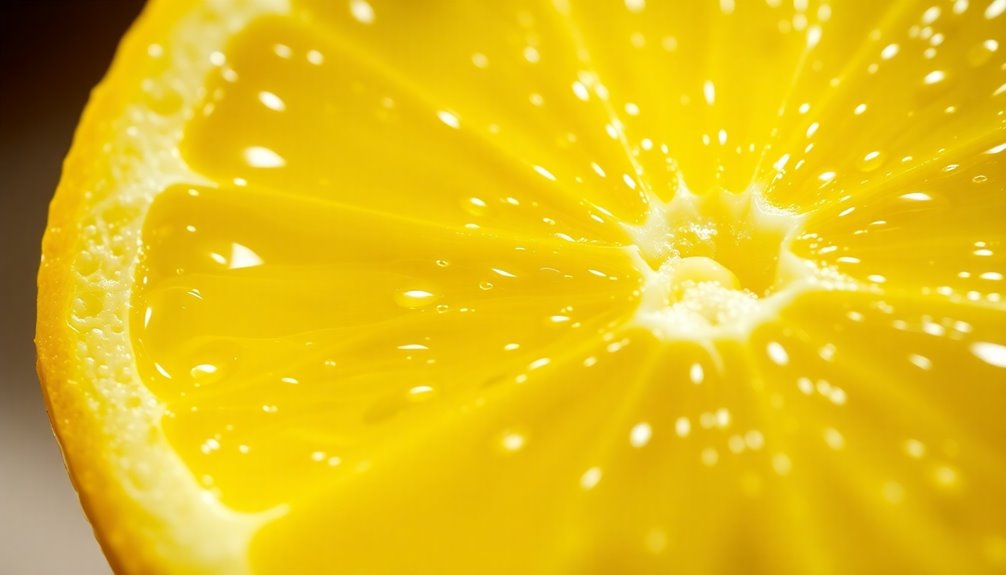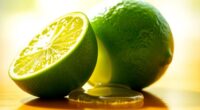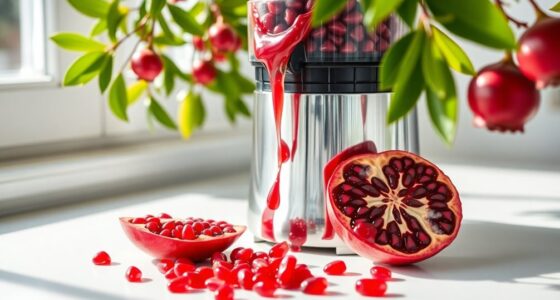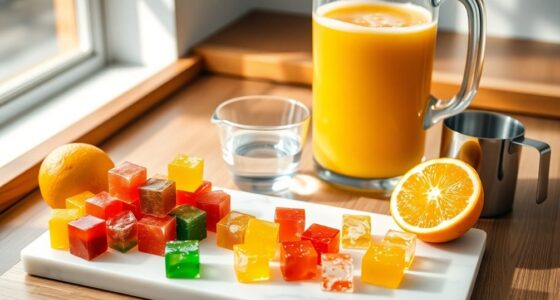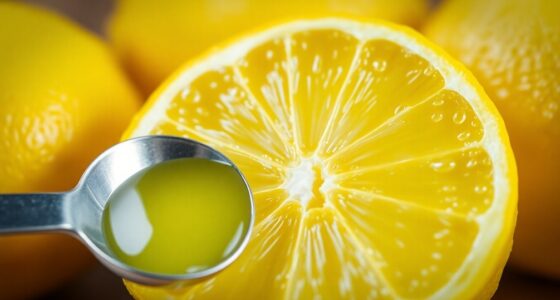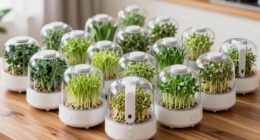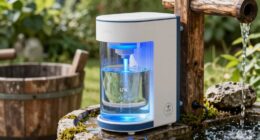Half a lemon usually gives you about 1½ to 2 tablespoons of juice, depending on its size and ripeness. A medium lemon tends to yield around 1½ tablespoons, while a larger lemon can provide up to 2 tablespoons. If the lemon's smaller, you might only get about 1 tablespoon. To get the most juice, try rolling the lemon on the counter before cutting it. Stick around to find out more helpful tips on maximizing lemon juice!
Key Takeaways
- Half a medium lemon yields approximately 1½ tablespoons of juice.
- A large lemon can produce around 2 tablespoons when halved.
- Smaller lemons may yield as little as 1 tablespoon of juice.
- Juice yield varies based on the lemon's size and ripeness.
- Techniques like rolling the lemon can maximize juice extraction.
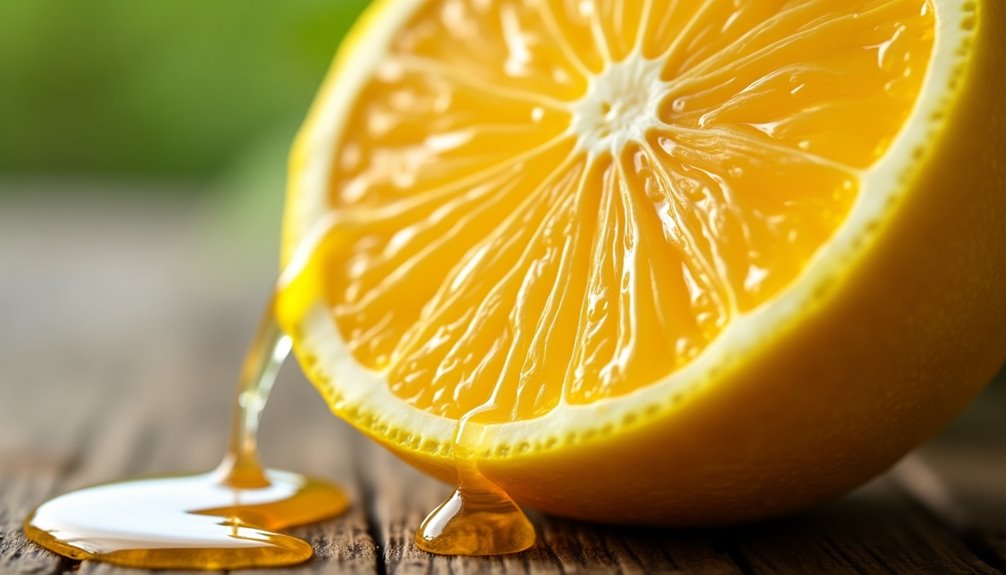
Have you ever wondered just how much juice you can squeeze from half a lemon? If you're cooking or mixing drinks, understanding the juice yield from a lemon can be really helpful. Typically, half a medium lemon yields about 1½ tablespoons of juice. So, if you're using a medium-sized lemon in your recipes, you can expect a decent amount of fresh flavor to enhance your dishes or beverages.
Now, if you happen to have a large lemon on hand, you'll get even more juice. Half of a large lemon usually produces around 2 tablespoons of juice. This slight difference can be significant when you're preparing a meal or crafting a cocktail.
It's worth noting that the juice yield can vary depending on the lemon's size and ripeness. Some smaller lemons may yield closer to just 1 tablespoon of juice, so it's good to keep this in mind when you're measuring for your recipes.
When you're aiming to extract juice in a recipe, it's always a good idea to start with the estimated yield. This way, you can adjust according to your taste preferences. If a recipe calls for the juice of one lemon, and you know you're using a medium lemon, you can confidently estimate that half of it will give you around 1½ tablespoons.
But if you find the dish needs a bit more brightness, you can easily squeeze the other half to enhance the flavor.
To maximize the juice extracted from your lemon, consider using a juicer. A juicer can really help in getting every last drop of juice in a lemon, especially if you're dealing with a particularly stubborn fruit.
Before you cut the lemon, rolling it on the countertop with a bit of pressure helps break down the internal membranes, making it easier to get more juice out. This technique can be particularly useful when you're working with half a lemon, ensuring you don't leave any liquid behind.
Frequently Asked Questions
How Much Juice Is in a Half of Lemon?
When you're curious about how much juice is in half a lemon, it can vary quite a bit.
Generally, you can expect to get about 1½ tablespoons from a medium lemon and around 2 tablespoons from a large one.
The size and ripeness of the lemon play a crucial role in the yield.
To get the most juice, consider using a juicer or a good squeezing technique.
Can I Use Bottled Lemon Juice Instead of Fresh Lemon?
When life hands you lemons, you can choose fresh or bottled juice. You can definitely use bottled lemon juice instead of fresh; it's convenient and has a longer shelf life.
However, you might miss that vibrant flavor fresh lemons bring, especially in dressings and desserts. If you go for bottled, remember to adjust your quantities—two tablespoons can often replace the juice of one half lemon, but always taste to ensure it suits your dish.
How Much Bottled Lemon Juice Equals Half a Lemon?
When you're looking to substitute bottled lemon juice for half a lemon, you'll want to use about 1½ tablespoons of bottled juice.
This amount typically matches the juice you'd get from a medium lemon.
Keep in mind that flavors can differ, so it's a good idea to taste your dish and adjust the amount if necessary.
For a large lemon, you might need around 2 tablespoons of bottled juice instead.
Is Half a Lemon Enough for Lemon Water?
Did you know that lemon juice contains around 5% citric acid, which adds that zesty kick to your drinks?
When you're making lemon water, half a lemon's juice is usually just right. It balances the acidity without overpowering your palate, making it refreshing.
If you're after a stronger flavor, you might consider using a whole lemon. But half a lemon often provides enough zing to elevate your hydration experience.
Enjoy your drink!
Conclusion
In the culinary world, half a lemon is like a splash of sunshine on a cloudy day—brightening up your dish with just the right amount of zest. You can typically squeeze out about 1 to 2 tablespoons of juice from that half, enough to elevate a simple salad or brighten a glass of water. So, the next time you’re cooking, think of that lemon as your secret ingredient, ready to transform the ordinary into something extraordinary. Imagine the possibilities as you experiment with flavors; it’s amazing how much juice from half a lemon can enhance a variety of dishes. Whether you’re drizzling it over roasted vegetables or incorporating it into a marinade, that small burst of acidity can truly make a difference. So, don’t underestimate the power of this humble fruit—its vibrant essence is just waiting to add a delightful twist to your culinary creations.
Cindy thoroughly researches juicing trends, techniques, and recipes to provide readers with practical advice and inspiration. Her writing style is accessible, engaging, and designed to make complex concepts easy to understand. Cindy’s dedication to promoting the advantages of juicing shines through her work, empowering readers to make positive changes in their lives through the simple act of juicing.

